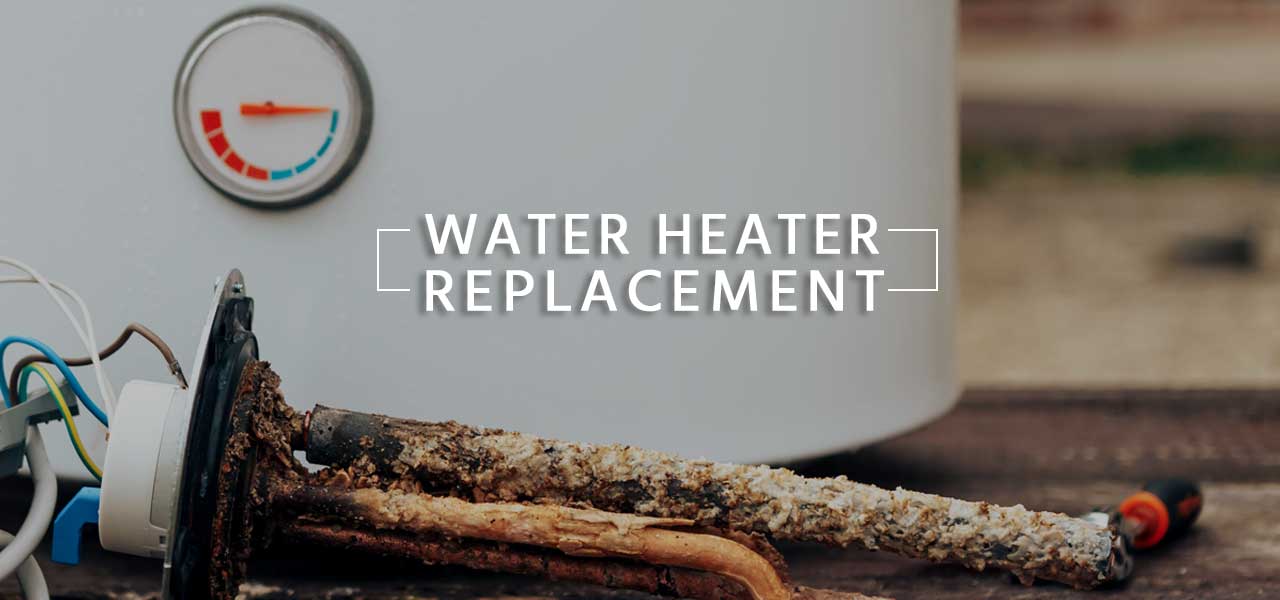Professional Water Heater Replacement in Houston
Every water heater is eventually going to fail and need to be replaced. At some point, every homeowner is going to need to know their options for water heater replacement in Houston. Instead of waiting until it’s too late, this blog hopes to give you some information about the newest advances available in water heating technology.
When Will I Need A Water Heater Replacement?
Tank-type water heaters typically have a lifespan of about 8-10 years, with many units developing leaks and other problems at that age. Anyone with a water heater should have a regular maintenance schedule to prevent severe damage to your home but especially homeowners with older units. If you live in one of our service areas and your water heater is in the 8-10 year range, it’ probably time to start considering a water heater replacement in Houston reasonably soon.
Types of Water Heater Replacements:
Is your water heater past its prime or already has an issue like leaks or diminished performance? When you decide it’s time to get a water heater replacement in Houston, you’ll need to choose what type of water heater to purchase. There are several options for water heater types and brands to select from, and we hope to help guide you through the basics below.
Tank-Type Water Heaters
Tank-type water heaters have been the gold standard for water heating for over 100 years and with good reason. If you live in a smaller home, or just have fewer hot water demands, a tank-type water heater replacement in Houston is still the perfect choice. Today’s tank-type water heaters are often equipped with modern fuel-saving features, and some can even be monitored and controlled from your smartphone or tablet.
Click to learn more about both our tank-type Gas Water Heaters and Electric Water Heaters.
Tankless Water Heaters
Tankless water heaters have been getting a lot of attention from residential and commercial customers lately. While somewhat more expensive at installation, a tankless water heater replacement in Houston offers greatly improved efficiency over tank-type units (with overall energy savings of up to 40%), and the bonus of endless hot water and hot water “on-demand.”
You can learn more on our Tankless Water Heaters page.
Recommended Water Heater Replacement Brands:
Tankless Water Heater Brands
If you are looking for a tankless water heater replacement in Houston, Nick’s Plumbing features hi-tech offerings from several respected manufacturers like Navien, Noritz, Rheem and Rinnai. Each company offers several models of tankless units, many with Wi-Fi capability that allows you to adjust water temperature and flow rate.
Learn more about them in our blog post “What Brand of Tankless Water Heater is Best?”.
Tank-Type Water Heater Brands
Happy with your tank-type unit and not quite ready to make the switch to a tankless water heater? Nick’s Plumbing also offers several tank-type water heater replacement in Houston models from manufacturers like Rheem, Rinnai, and Bradford White.
Water Heater Replacement Near Me:
If you live in the greater Houston metropolitan area and are searching for a water heater replacement near me, quit searching and call the experienced and licensed plumbers at Nick’s Plumbing and HVAC.
At Nick’s Plumbing and AC, we have a long-standing reputation for quality work with thousands of five-star reviews to prove it. Since 1979 our team has been the premier company for water heater replacement in Houston, and we’re looking forward to serving you as well.
Call Today, We’re On The Way!
Watch Our Video on Water Heater Replacement in Houston
Nick’s Plumbing & AC Live Video Transcription:
On today’s show, it’s all about water heater replacement in Houston.
I’m John Eccles. Richard Saad,And today we’re going to be talking about plumbing problem that comes up probably every 17 years, and it’s probably one of the more expensive plumbing repairs that you ever have to do inside of your home. So what are we talking about today? We’re talking about water heaters, right? We’re talking about water heaters in the, uh, in the home tank style is what we’re going to emphasize on. And uh, these things, every 17 years they, uh, they start going out. That’s right. And they’re the one kind of thing that as soon as you put it in, just like a lot of our fixtures, you start putting water in it, it begins to fail just like our bodies put water in it. And what does it do? It starts to corrode and starts to cry. Try. Now, some manufacturers will tell you guys that it’ll last 12 years, right?
There’s an average life. Well, it depends on what part of the country that you’re in. And Houston, we have corrosive water and it depends on what they’re cleaning the water with. Is it chlorine? Chloramine right. It depends on the byproducts, on the disinfectant into the water and how corrosive year water is. That will basically dictate how long it’s gonna last. So in Houston, what we tell people is it starts to degrade if you have not taken care of it. Yeah. That’s the key and a half. Got to take care of it. You’ve got to maintain it. But if you really haven’t done that, it’ll really start to degrade at year seven. You should always, always throw them away at your 10, no matter what the corrosivity of our water supply, uh, basically get stamped down to that steel and it starts like he said, quoting from day one.
Right. It’s a problem. I think you’ve touched on it, right? So these, these tanks are made out of an inner steel. The inside of this tank is, uh, may was still in. It’s coated with glass, right? Yeah. And we have, um, what ends up happening is during the manufacturing process, not the, y’all want know this, but it’s kind of interesting. It doesn’t coat quite perfectly on every single heater. And, uh, eventually the water ends up corroding away. Right. And the manufacturers have done what they’re supposed to, the anode rod does what it’s supposed to and it creates a situation where that water and those minerals are attacking the sacrificial metal on that rod versus the tank. But if you’re not maintaining it and you’re not looking at those things, that, that rod is going to go away in a year or two. Yeah. And absolutely.
And then once the water started doing, it’s attacking the tank attack in the tank. You know, and I would also say it depends on what part of Houston that you’re actually in, right? Are they doing half well, water, half surface water. They do an all surface water. Are they blending water like the villages memorial villages? They’re doing an a lot of blending right now and they’re buying water from Houston. So they’re blending, um, Spring Valley’s blending. Houston is all surface pretty much, right? Yeah. So you want water came from the surface. Just think about how nasty that is. Corrosive.
Speaking of that, you know how corrosive it is. It doesn’t just attack the tank and it’ll attack the, the pipes going into the tank, the valves, the gas burner assembly, if he gets on it. You know, as soon as this water starts hitting these items and we remember this, this appliance or this plumbing, uh, equipment is designed to hold and transport this water. So it is in constant contact of this moving up and through the system. So this is something that, uh, you know, that you’re going to see unfortunately throughout your it. Well, as long as you like hot water, if you don’t like how water, you might not have to worry about it too much. You know, in Houston you say that in Houston you can’t have a house, no hot water. And that’s true. The city mandates that you have hot water. It’s they, they haven’t under sanitarium cause they don’t want you bathing in that corrosive cold.
You know the one that you drink. Right. I want you to drink. That’s right. I agree. So what are some signs that our water heater might need? Replacing few signs. Right? And you guys at home, we’ll be able to, okay, you’re taking a shower, let’s say every day, right? If you start getting hot water loss, so it’s not lasting as long, that’s a telltale sign that that water heater is going out. Right. Another sign is a popping, banging noise. All right, everybody I think in this town is heard that at least once. Yeah, a popping banging, something around that nature and there was, what is that? And then you go up there and you’re like, it’s our water heater. Yeah. Oh my goodness. And it sounds like something hit in the side of it, but that is mineral deposits. And if you do not maintain that water heater every year, those mineral deposits are gonna form.
You’re not going to be able to get them out. And they, every time your burner comes on, they are going to bang away basically popping that noise is popping array from that burner assembly. That’s what it does. You know, obviously there’s the obvious telltale sign. You go up there and there’s literally a elite coming out. You have water in your drain Pan, you can physically see the league. Obviously those are some items where you know that’s a no brainer that okay, we need a new water heater. So what’s the number one insurance claim in Houston? Well if you’re a fan of this show, this answer should come right to you to try. It’s water damage. That’s right. What’s the number one thing that creates water damage? Human error that happens. Um, yeah, that happens a lot. It’s got a water heater. Water heaters close to number one.
Yeah. Either that or piping structure yet you’ve got old galvanized piping that goes to the water heater and it fails, right? Yeah. Or the water heater fails. It’s usually one of those two items. If you get a burst tank, that’s a big one. Cause that’s a lot of water coming real fast. Well you guys, I can tell you firsthand because that did happen to me and I got real lucky. My water heater was actually in the garage. Oh Nice. And when I got home, water was screaming down the driveway. That’s not our good and it just, it created a huge hole in the bottom of that. And I was so disgusted. I got home from work like at eight o’clock when at that night and I just went and turned it off and started flipping channels and not thinking too much. That’s one of the, got it fixed the next day.
Sounds like you had a good day. Uh, it was one of those days. And to come home to that, uh, so there was an inch of water throughout my entire garage. What would that have done to the house? Yeah, that’s some damage when we see that all the time. Oh yeah, absolutely. I know, you know, people that aren’t in our industry there, they’re doing their own thing and in a different industry they don’t understand how much this happens. Yeah. They let that water heater go on too long and next thing you know it corrodes. And next thing you know at pan doesn’t hold the water. It’s a much better ceilings down on your bed, the ceilings down on an antique and it ruins everything. All the insulation is on the floor. And it is soaking wet. Yeah. It creates a bigger much bigger mess. Yeah, slightly. So that’ll make that water heater replacement really inexpensive if that is actually happy.
Oh yeah. Yeah. If you’re in the middle of one of those situations, it doesn’t seem like much at all. That’s exactly right. So I want to ask a question. Okay. Tanker tankless, we talked about tank today we told people we were going to talk about tank, but let’s flip gears a little bit because tankless are popular, people want them, they’re important, they have a great function and I was so excited my tank Bro Cause I got a tankless. So I think there’s some huge benefits here, right? Absolutely. So if you will, I’m going to talk around it for a minute on. If you’ve got two tanks in the attic, it’s a no brainer tankless. That is a no brainer. You guys buy a tankless every time. The horror stories that you have heard, if you have heard any around tankless or if you’re reading the Internet, you’re getting a lot of information from that Internet that a lot of it is actually wrong.
It’s usually an install problem that creates the failure of a tankless. If you have a company, a plumbing company that knows what they’re doing, your tankless is not going to fail. It’s going to give you 20 plus years of service. Now you need to maintain that tankless just like you do your tank right. We have all been guilty of not maintaining. Right, but you change the oil in your car. You should maintain your tank or tankless the same way and get it regimented on scheduling and this is just what you do and you spend the money on it. Yeah. And you’ll get 20 plus years of service out of that unit. So that’s part of the big benefit of purchasing a tankless versus tank. Now in saying that if you’ve got one tank in the attic, you’re going to stay in this house, it’s going to break even points five, six, seven years roughly depending on what you have to do to convert that tank to the tankless.
Right? Right. So it’s going to depend. If you’re going to stay in that house, are you going to get the money back from the upfront cost? And I tell everybody that rate or the, those years are break even is around six. So if you’re going to be there six plus years by a tankless, get rid of the tank. That’s one thing. Second thing, if you’re in a new house and none of these home builders are hardly putting them in because they are more expensive, they want everything cheap, cheap, cheap, right? They want the $50 faucet and the cheapest tank they can put in your attic. So why aren’t they doing tankless? That’s why they’re not doing it because it’s an added cost. Yeah. You know? Absolutely. But when that tape goes out, no brainer. But a tankless, I had the tankless, you know, the only time that I would not recommend it as like you’re saying, customer knows they’re going to be moving, you know, and they don’t want that up front cost cause they’re not gonna be able to recoup.
But you know, those tankless units have come such a long way and there’s so, you know, they’re affordable. Oh yeah. Oh yeah, yeah. They are affordable. They’ve gotten way different than, you know, five, 10 years ago if you replace the tank, the rule of thumb is if you have to replace your tank water heater, you replace approximately three tanks to one tankless. Yeah. So your tanks actually costs you more. Well, if you, if you maintain the tank list the way it’s supposed to be, the core unit, you’ll never have to replace it. You’re going to have it and you’re going to be, you’re gonna be plugging parts in as it goes. It’s true. It could, it could honestly, that one tankless, if you know, now obviously you’d be changing in parts, but you could probably keep that thing for a lot longer than the 25 Europe.
Yeah. They’ve been around since the forties yeah. So I mean, that’s basically what they’ve used because their space is not really available there to stick a tank somewhere. Right. And they work great. You know, my units, 12 years old, never had a problem, but of course I’ve got a softening piece to my house and that’s a big thing to doing softening pieces to these tankless water heaters. It’ll keep us away from actually doing maintenance if you use a lot. Yeah, if you do the softening piece. Absolutely. That’s for sure. Now in saying that if you have a tank of water heater and do a softening a piece of equipment as well, um, it’ll extend the life of that unit is out on the tank without water, anything like that, it’s going to help every plumbing fixture you have regardless if it’s a water heater, an actual refrigerator, dishwasher, it’s going to help out everything just because of our water.
Water is a corrosive agent and don’t get me wrong, we needed to live, but it is a corrosive agent. Uh, and it, it, it helps us out. You know, it keeps us, you know, employee, but it’s a, it’s definitely is something that if you address it before it gets into the home, it’s going to do nothing but help you out and try and extend the life of your tank water heater or your tankless water heater. Yeah, so let’s give some people some averages. You know, on, on water heaters, which is really tough. Every home is different. You can go to our website next plumbing.com and we have averages on cost on water heaters, whether it’d be electric tank, gas on tanks or tank, less correct gas. We really don’t, I don’t think we have electric tankless on there. We really don’t do them. I don’t like them.
You’re meters going to spin off the hook. They’re good for garage apartments and the heights and Montrose area. That’s about it. Ones that aren’t used very much. People aren’t living in them. But if you go to our website next plumbing.com, you’re going to see and go to our costs guide, but you know, they’re going to start, where are we starting at 1200 and 1400, something like that. Um, I think, I think the tank style is starts around 14 for 30 gallons and then they’re going to go up from, there are gas codes change. We are by law required to make sure that everything, if we’re going to put in a new unit, everything has to be current gas regulation. So if something has changed and your home was built 20 years ago, more than likely at 20 years, it’s going to be the same earlier.
It’s going to be different. Um, there is some minor things that they adjusted about five years ago that I’ll need to be done to the unit, but not very much. And it’s not expensive, but all of those things impact the cost of that unit going in. So whether you put in a tankless or a tank, you’re could possibly have more than just that. Going in and retrofitting of course, will be more so as usual, we’re always here. Absolutely. If you have any questions, concerns, you just want to talk about hot water and water heaters. Give us a better call me. I answer questions better. I talk longer, right? I talk less. Just get to the point. I’ll tell you what you need. We go our ways. We’re good, but call anytime. We’re always here. Thank you guys for watching. Thank you so much.
























